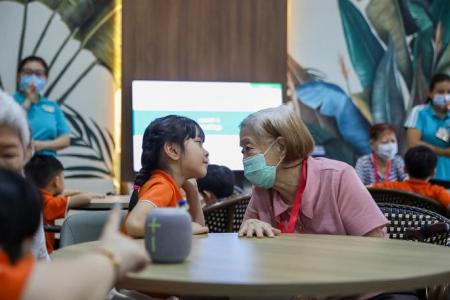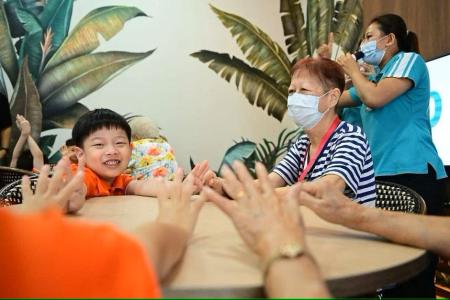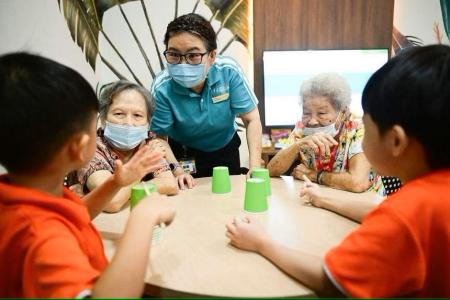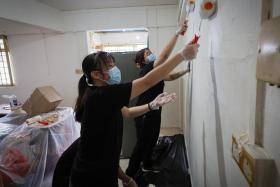Young and old bond over dialect lessons at senior daycare centre
Twice a month, pre-schoolers from My First Skool at Braddell Heights Community Hub visit seniors at the senior day care centre two minutes away to learn dialects such as Hokkien, Teochew, and Cantonese.
Seniors teach the Kindergarten 2 children simple greetings and how to count in dialect.
The seniors smile even as bubbly kids fumble at attempts to learn some Hokkien phrases.
The dialect lessons, which started in 2023, are part of the Intergenerational Programme by NTUC Health and NTUC First Campus, which run eldercare and childcare centres respectively.
Apart from dialect sessions, pre-school children and seniors make arts and crafts and hold festive and birthday celebrations together regularly.
When the programme started in 2014, activities were held on an ad-hoc basis. The Intergenerational Programme was incorporated into the curriculum at NTUC’s My First Skool pre-schools as well as regular programming for seniors at NTUC Health’s elderly care facilities in 2017.
The goal of the programme is to empower seniors with a greater sense of purpose in sharing their knowledge and culture through activities while inculcating in pre-schoolers values of empathy, compassion and respect for seniors, said Ms Chan Su Yee, chief executive of NTUC Health and NTUC First Campus.
“Over the years, we have witnessed improvements in seniors through the Intergenerational Programme. For instance, seniors with conditions such as dementia and aphasia showed improvement in social interaction and engagement during the sessions.
“We were surprised that a senior who was usually very quiet came to life when he was asked to tell a story to the pre-schoolers.”
Aphasia is a disorder that limits a person’s ability to speak or understand others.
Currently, intergenerational dialect sessions are being piloted at the NTUC Health Senior Day Care in Serangoon Central, and they are gaining traction.
Ms Cheryl Lim, who manages the programme across the senior day care NTUC centres, said that the dialect sessions will be expanded to all 26 centres, hopefully by the end of 2025.
“We want to let them know that even though you feel you are old, age is just a number, you can still contribute. You still have a wealth of knowledge,” said Ms Lim.
Madam Goh Ngan Nui, 92, who participated in a dialect session on June 10, said that she enjoyed the children’s company as they were cute, and they listened to what she said.
She added that, after telling the children that she was not fluent in Mandarin, a girl told her, “I can teach you Mandarin popo”. Hearing that made Madam Goh happy.
To Madam Moh Yuen Wan, 76, the lessons were also a way to relive the time she used to play with her granddaughter when she was a child. Now her granddaughter is 15 and does not spend as much time with her as before.
“When the child (whom she met for the second time) recognised me today, I was very happy,” said Madam Moh in Mandarin. She said he was very shy at first, but he gradually warmed up to her after talking for around 15 minutes.
Elise Goh, six, who participated in the Hokkien session, said one of her favourite words she learnt was “zha bor soon”, which means granddaughter in Hokkien, and that she enjoyed learning from the seniors.
To engage seniors and promote intergenerational interactions, two student volunteers from NUS High School of Math and Science launched the Leggo! (with grandkids) programme at the NTUC Health Active Ageing Centre Care in Bukit Batok West in February 2024.
Each senior participant is paired with one or two children, and they build a robotic car together with Lego blocks.
Using Scratch 3.0, a programming language, the NUS High students teach the seniors basic coding skills to program the cars.
The pre-schoolers then race the robotic cars programmed by the senior they were paired with at the end of the session.
Other organisations have also started similar programmes, which are popular in many countries because they have shown to not just bring cheer and a sense of purpose to seniors, but also help children develop social skills.
Other common spaces for seniors and children to interact with each other include St Joseph’s Home in Jurong West, Singapore’s first intergenerational playground and infant and childcare centre which was launched in 2017, and is located within a nursing home.
The playground has features such as a see-saw with a ramp to facilitate wheelchair access, and the merry-go-round comes with wheel-lock features for wheelchairs and custom-built seats for toddlers. The home also has a cafeteria with senior- and child-friendly furniture and a “fun house” where nursing home residents, children and volunteers can engage in activities such as painting.
Dr Sanveen Kang, lead clinical psychologist and founder at psychology clinic Psych Connect, said that interaction with children can help alleviate feelings of loneliness and isolation often experienced by seniors.
Engaging with older adults can also help children become more comfortable interacting with people of all ages, promoting inclusivity, said Dr Kang.
Knowing that they are making a positive impact on the lives of children by teaching new skills and sharing their wisdom can also boost seniors’ self-esteem and provide a sense of accomplishment and satisfaction, she said.
And having a positive attitude about ageing protects seniors from developing dementia, possibly due to reduced stress, said Dr Philip Yap, senior consultant at the department of geriatric medicine at Khoo Teck Puat Hospital.
He added that seniors who interact with young children showed improvements in cognition and physical function.
Intergenerational activities aid children in their social development as children develop empathy and a desire to help others when they see how frail some seniors may be, Dr Yap added.
Get The New Paper on your phone with the free TNP app. Download from the Apple App Store or Google Play Store now




